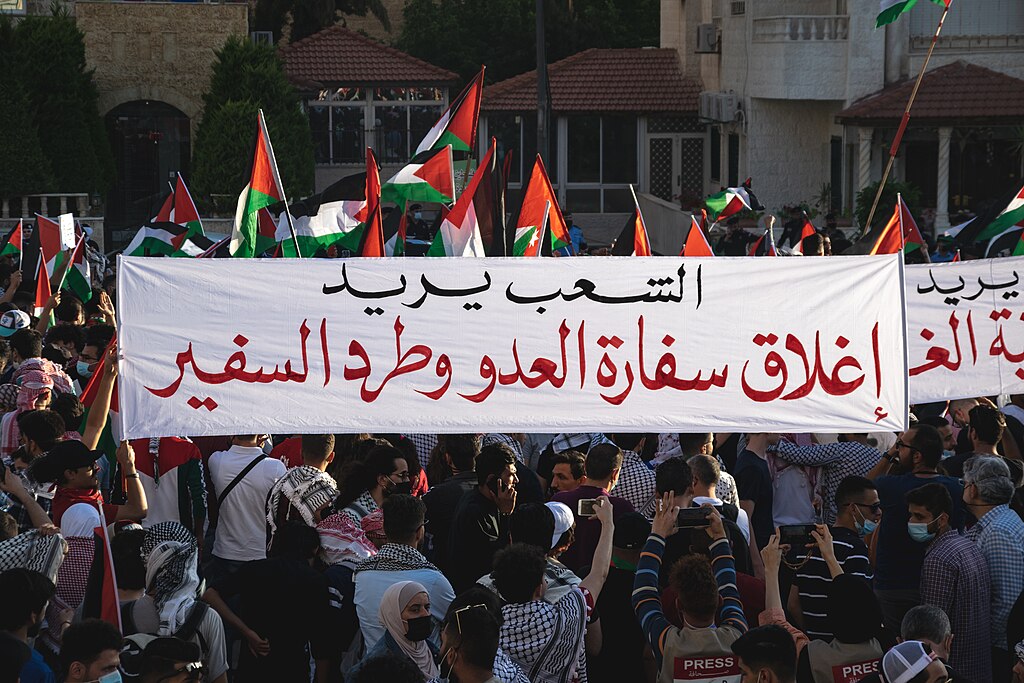It has long been said that Israel’s security starts at Jordan’s border. Since Israel launched a war in the Gaza Strip following a Hamas-led attack on Oct. 7, perhaps more than ever, the saying holds true.
On Oct. 21, busloads of Iranian-linked Iraqi protesters headed toward their country’s border with Jordan, demanding to be allowed to cross so that they might start on the road to Jerusalem, fighting against Israel. A week prior, Jordanian riot police dispersed hundreds of protesters who rushed the country’s border with the West Bank.
The Jordanian government’s position on Israel, in which it straddles the security demands of the country’s western allies and the overwhelmingly pro-Palestinian sentiment of its population, has become increasingly difficult to maintain since Oct. 7.
Jordan’s king and foreign minister have unequivocally condemned Israel’s military operation in Gaza, which has killed more than 18,000 in just over two months, according to the Gaza-based health ministry. Jordan’s foreign ministry has expelled Israel’s ambassador from Amman, and publicly rebuked its top ally, US President Joe Biden, for canceling his visit on Oct. 17, seemingly for his support for Israel.
Still, Jordan’s statements have not been enough to quell the anger spiraling among its populace, who have called for stronger actions from their government. Jordan’s Foreign Ministry did not respond to requests for comment.
“The state is only pretending to be in line with the street to absorb anger and resentment,” said one Jordanian activist, who spoke under the condition of anonymity for fear of reprisal. Otherwise, how could a helicopter arrive to drop medical supplies at the Jordanian Army hospital in Gaza?”
Specifically, Jordanians have started calling for the cancelation of the country’s 1994 peace treaty with Israel.
The treaty, which was mediated by the US, definitively put an end to decades of on-and-off conflict and created the basis for mutual security cooperation between the two countries. Since then, Jordan has built on the peace treaty with several joint-economic projects, such as the import of Israeli natural gas and a UAE-brokered “water for energy” deal, both of which faced stiff public opposition at home.
Calls for canceling the treaty, which have for years been expressed behind closed doors, have moved into public forums over the last two months. Even high-ranking public figures have echoed these calls, with some going a step further and calling for Jordanians to prepare for a confrontation with Israel.
“The moment of confrontation had been already present, and what the right wing of Israel did today is draw our attention to it,” Mamdouh al-Abadi, Jordan’s former minister of state, said in an interview on Nov. 11. “It is my duty and the duty of all Jordanians to show readiness to fight.”
The former minister added that he wanted his grandchildren to take up arms to defend Jordan, just as young Israelis do for their country.
Canceling the treaty?
The possibility of Jordan currently canceling the peace treaty is “unlikely,” said Oraib Rantawi, the founder of the Amman-based al-Quds Center for Political Studies. The factors that would push the country to withdraw from the treaty would likely come from external pressures, rather than from its own population.
Despite a deep feeling among Jordan’s government that Israel has not honored its side of the peace treaty agreement, particularly under the current government headed by Prime Minister Benjamin Netanyahu, Jordan depends on Israel for key aspects of its national security. Jordan suffers from an energy and water deficit, and relies on Israel for natural gas and is working on accessing desalinated water from Israel.
Both the Jordanian government and Israel foster a deep-seated distrust of Hamas, as it is an outgrowth of the Muslim Brotherhood — the main source of political opposition in Jordan.
Jordan’s only partner in the Palestinian territories is the Palestinian Authority (PA), which governs the West Bank on Jordan’s western border. The PA is wholly dependent on Israel for its existence, having minimal revenues of its own and facing dwindling support, viewed by its constituents as impotent and corrupt.
Further, Jordan would no doubt face backlash from the United States for a unilateral cessation from the 1994 peace treaty.
Jordan receives over $1.4 billion from the US annually — some 3% of its GDP — and its security services rely on the US for assistance and logistical backing. Like the former US President Donald Trump’s administration before it, one of the Biden administration’s key goals in the Middle East has been encouraging normalization with Israel.
Still, even the Jordanian government has its limits.
“The forced transfer [of population from the West Bank] will be a red line. And if for any reason, the extremists do something against al-Aqsa mosque and the Hashemite custodianship, it would be a big treaty violation,” Rantawi said.
There have been increasing calls from far-right Israeli politicians since Oct. 7 to simply push Palestinians in the West Bank into Jordan. On Dec. 9, Yair Netanyahu, the son of Israel’s prime minister, posted a picture, saying “Jordan is Palestine, Palestine is Jordan.”
Jordan’s prime minister has vowed that his country would use “all means in its power” to prevent a mass population transfer or a potential expulsion of Palestinians from the West Bank.
The view of the Jordanian street is that the [Palestinian] resistance represents it.
– Duaa Jaber, media personality and talk show host
“The Jordanians are very worried about what is happening in the West Bank, because they are afraid if violence spreads there, some folks might move to Jordan,” a western diplomatic source told Inkstick under the condition of anonymity as they were not authorized to talk to the media.
Increasing settler violence, internal protests over the PA rule in the West Bank and Israel’s throttling of tax funds provided to the PA have all created worry among Jordan’s security establishment over potential spillover from the West Bank’s insecurity. There are further fears in Jordan that the PA’s collapse would lead to Hamas presence on its borders.
“What Israel is doing, it really makes you question: What do they want? Do they want to [mess] the whole thing up, turn it upside down?,” the western diplomatic source said, echoing their conversations with Jordanian security officials.
On Nov. 21, Jordan stationed tanks along its border with Israel in what was widely interpreted as a message to Israel that the country would not accept any attempt to push Palestinians into Jordan.
The Jordanian government has also publicly stated, even prior to the current Gaza war, that any infringement of its custodianship over Muslim and Christian holy sites in Jerusalem, would trigger a strong reaction.
The Hashemite monarchy has historically been responsible for these sites, and its custodianship is recognized within the 1994 treaty. Its status as protector of Jerusalem’s holy sites is of great personal importance to King Abdullah II, as well as a source of legitimacy to the country’s overwhelmingly religious population.
Stifling dissent
Jordan’s government is aware of calls from its own people for stronger action toward Israel, but it has responded to these demands with escalated rhetoric in public — and escalated repression in private.
Less than two weeks into the war, as the death toll swelled in Gaza, Jordanians broke through security cordons and attempted to storm the Israeli embassy in Amman. Scuffles with security forces ensued and fires were lit in front of the embassy, though demonstrators did not ultimately manage to breach the embassy itself.
Since then, Jordanians have held near-weekly protests across the country against Israel’s military operation in Gaza and calling for Jordan to take a stronger stance against Israel.
The government has responded by arresting “no less than 300 protesters,” said Hala al-Ahed, a lawyer with the National Forum for Defending Freedoms. The exact number of detainees is unknown, as not all were appointed lawyers and a “large number” were distributed across Jordanian prisons, the lawyer explained.
The arrests have further inflamed anger among Jordanians, cementing a sense that the government is not truly committed to Palestinian resistance.
“The view of the Jordanian street is that the resistance represents it. So for you to arrest a person who supports the resistance means … that you clash with the will of the Jordanian people,” said Duaa Jaber, a talk show host and media personality affiliated with the political wing of the Jordanian Muslim Brotherhood.
Jordanian media has held back on reporting on the exact number and status of those detained for protesting in solidarity with Palestine. Despite the media hush, Jordanians continue to have increasingly vocal debates about whether their government is doing enough to stop Israel’s operation in Gaza.
“As long as you are in solidarity with the Palestinian people, meaning you send aid, demand a ceasefire in Gaza, why are you [against] those who are in solidarity with you?” Jaber said.





















